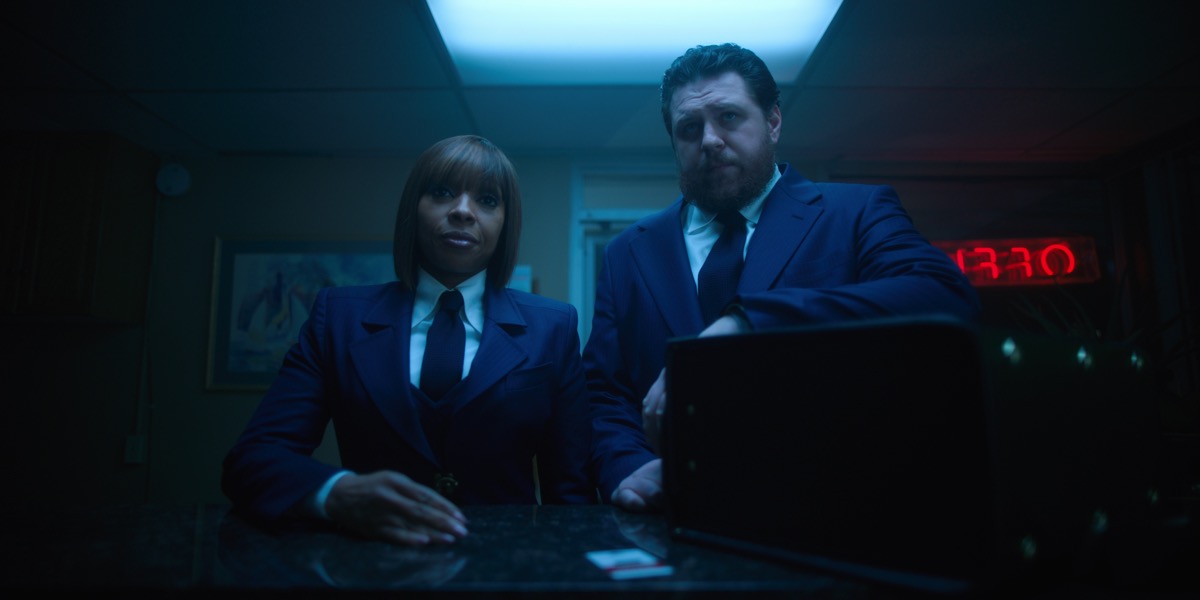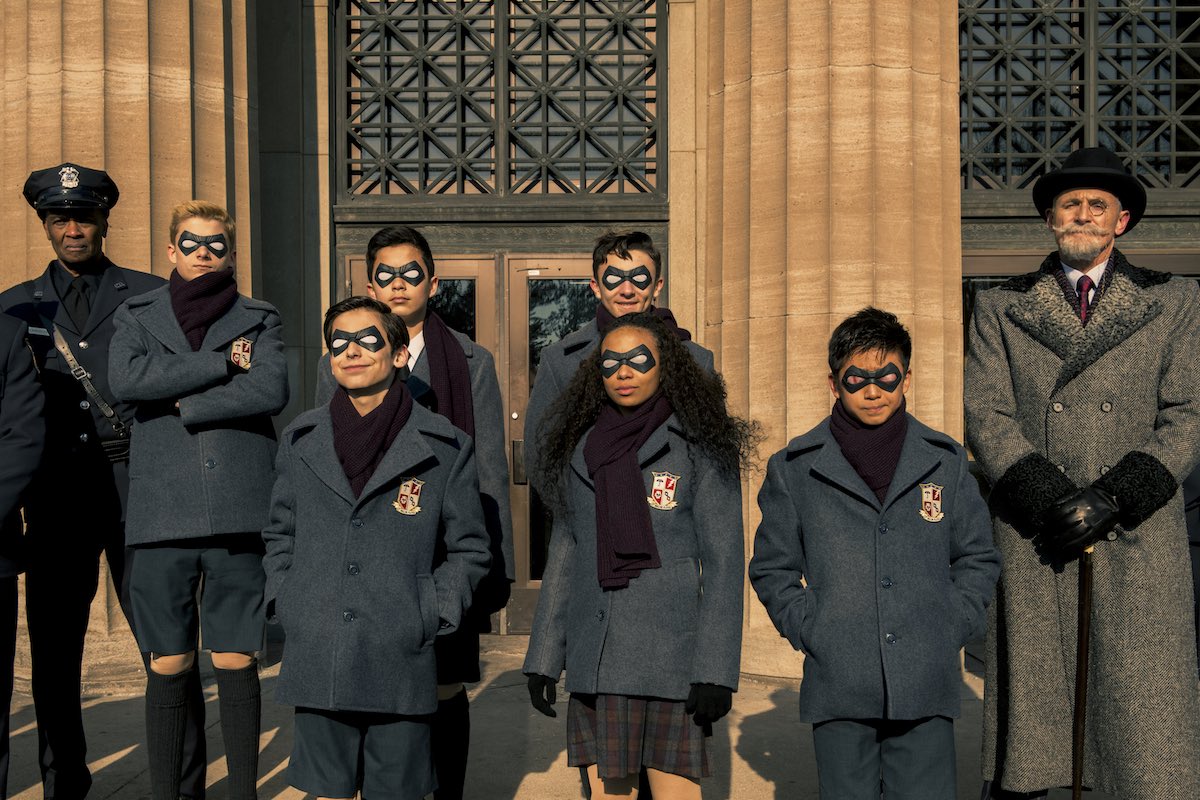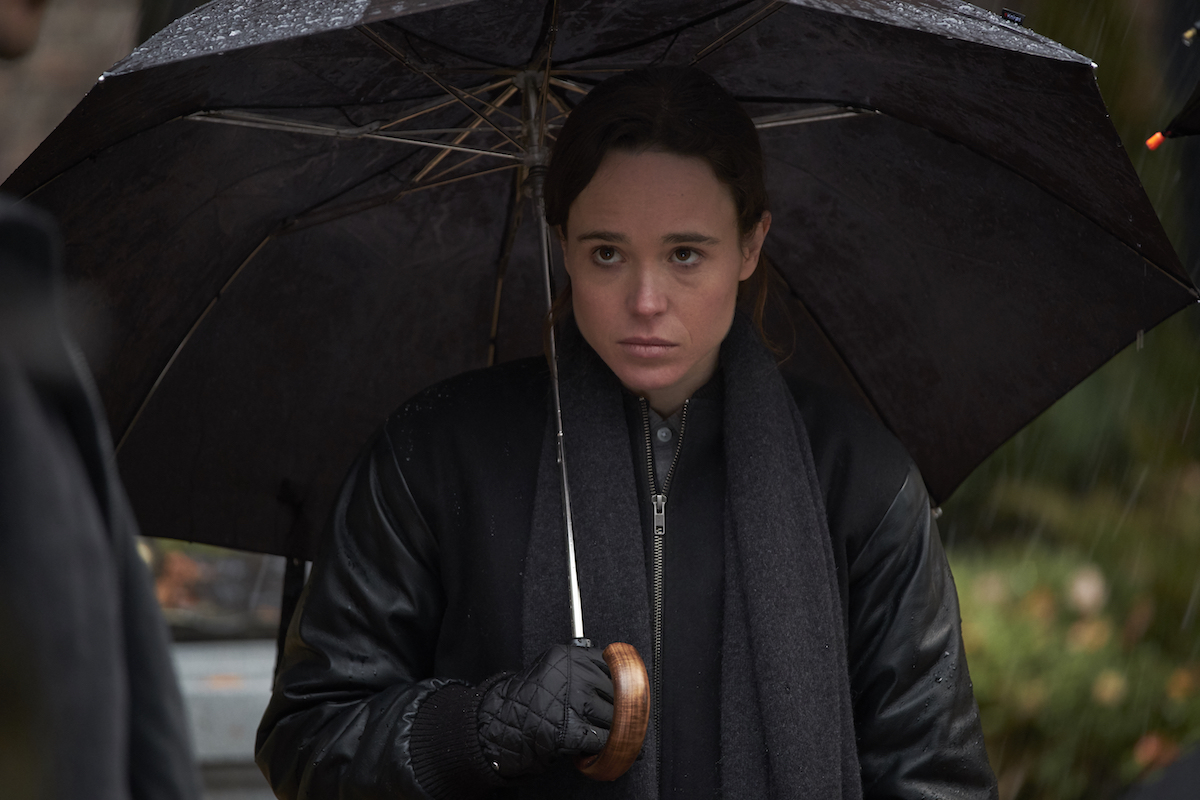Netflix’s The Umbrella Academy leans hard into the absurdity of Gerard Way’s and Gabriel Bá’s superhero epic comic series, while also expanding the original character arcs in meaningful ways. When we meet the late Sir Reginald Hargreeves’ (Colm Feore) adopted children—numbered one through seven and given human names by their “mother,” a robot built to care for them—they are maladjusted, superpowered adults who’ve been brought back together after 13 years due to their father’s death.
At least, that’s the simple version. The more complex version is that they have just eight days to stop the apocalypse, though none of them know that yet. Number 6 is dead, Number 5 (Aidan Gallagher) is missing, and Number 7 (Ellen Page) is “extra ordinary,” unlike her brothers and sister.
For those who are unfamiliar with the Dark Horse comic series, don’t fret: showrunner Steve Blackman and the writing team do plenty of heavy lifting to move through the exposition as smoothly as possible, all while keeping the audience tuned into the subtle intricacies of this bizarro family. As much as I love the original Umbrella Academy comics, I must admit: the series is more coherent, so newbies to the story will feel right at home.
It’s also utterly, completely perfect as a TV adaptation.
“I think we did a good job of honoring the comics but we’ve got some interesting stuff for you,” Gallagher said during the cast panel at New York Comic Con in October. Cast member Robert Sheehan added, “You have to take liberties. You have to splash a bit of your own originality into the soup.”
They’re both right, which is such a relief, after years of loving these comics and hoping for a TV show, that I can’t even put it into words. But I’ll try.
For this review, Netflix provided The Mary Sue with all 10 episodes of The Umbrella Academy’s first season. Without giving away any spoilers, I can confidently say that this is one of the best and most dynamic TV series I’ve watched in quite some time; from the cast to the music to the fight scene choreography, this show goes all out.
That includes a cast that frankly shouldn’t work on paper, but nevertheless oozes chemistry onscreen and really drives all the character work home.
Gallagher, a former Nickelodeon star whose passion for The Umbrella Academy was on full display at NYCC, embodies the complexities of Number 5 with incredible charisma. As the series barrels toward its explosive finale, Gallagher shines as he reconciles being a 58-year-old man in a 13-year-old’s body, with the life experience to back up his decisions. He also exudes a frenetic urgency that underscores just how little time he and his siblings have to stop the apocalypse—which, in some cases, is something the rest of the Academy fails to recognize.
Page, whose character, Vanya, is a wicked talented violin player dealing with a lack of actual superpowers, has perhaps the most difficult character arc of the season. Vanya is a step away from Page’s past roles, and her performance in this series truly showcases her range as a performer.
As Vanya struggles to reconcile with each of her siblings after she writes a memoir exposing their father’s strange ways (a la Michael Huisman’s character in 2018’s The Haunting of Hill House), she also struggles to figure out who she is and how she does—or doesn’t—fit into the Hargreeves family. Page is utterly mesmerizing in this role, even as her character’s pain makes you want to look away from the screen because of its intensity. Her performance is raw, honest, and grounded in real experiences that draw the audience’s empathy as often as its fear.
Number 5 and Vanya are joined by Number 1, a.k.a. Luther/Spaceboy (Tom Hopper); Number 2, a.k.a. Diego (David Castañeda); Number 3, a.k.a. Allison/The Rumor (Emmy Raver-Lampman), and Number 4, a.k.a. Klaus (Sheehan). Each sibling has a specific set of powers and a specific set of loyalties, dictated not just by their complicated relationships with their abusive father, but by their interactions with each other.
Luther and Diego are in constant competition to lead the team; Allison is desperate to avoid using her powers because of how they ruined her marriage and separated her from her daughter; Klaus is so hellbent on keeping away (literal) ghosts that he drowns himself in drugs and alcohol. These characters are complicated, stubborn, and in their own ways, awful. The way the actors play off of each other makes for wildly compelling television, especially as the plot reveals itself and they each get a piece of the series spotlight.
And then there are Cha-Cha (Mary J. Blige), Hazel (Cameron Britton), and The Handler (Kate Walsh), whose performances are, in Hazel’s words, “cuckoo bananapants” good. The writers’ use of time travel to further the plot and explore the characters is facilitated not just by Number 5, but by these three villains, two of whom are highly sought-after assassins. Blige, in particular, delivers a powerhouse performance as the gun-lugging, ass-kicking Cha-Cha, with Britton providing comic relief, and Walsh delivering such a straight-laced and serious performance that it made all of the hair on my body stand up.

Mary J. Blige as Cha-Cha and Cameron Britton as Hazel in The Umbrella Academy. (image: Courtesy of Netflix)
Blackman’s adaptation doesn’t succeed solely because of its excellent cast and writing. As mentioned above, the music—overseen by music supervisors Maggie Phillips and Christine Greene Roe—is fantastic. Fight scenes are set to tracks by the likes of Queen, They Might Be Giants, and Lesley Gore, while one of the most emotional scenes in the series is set to a heart-wrenching track by Big Thief. There are also dance sequences (yes, you read that right) that establish levity even in the darkest and most depressing episodes.
I would be remiss not to mention the evocative violin pieces used in this season, as well. Although Page admitted at NYCC that she is not a prodigious violinist, Vanya certainly is—and she plays throughout the series, both for scoring and for plot. From the very first moments of the very first episode, the violin is a character in and of itself.
It also employs some truly seamless CGI, as evidenced by screenshots that have been released of Sir Hargreeves’ chimpanzee butler, Pogo (voiced by Adam Godley). His introduction is so understated that it requires a double take to truly understand that yes, he’s a talking ape and no, he doesn’t look even a little bit out of place.
For those of you just joining us: Yes that is @EllenPage. Yes that is a chimpanzee butler (his name is Pogo). pic.twitter.com/B7ZrlmOdBs
— Umbrella Academy (@UmbrellaAcad) January 28, 2019
When The Umbrella Academy hits Netflix on Feb. 15, prepare for a very wild ride, and an emotional one at that. The season finale absolutely leaves space for additional seasons, and with Way and Bá’s series continuing after a decade-long hiatus with The Umbrella Academy: Hotel Oblivion, there are plenty of routes the TV series can take. I’d be interested in quite literally any of them, as long as this cast and crew are behind the wheel.
(featured image: Christos Kalohoridis/Netflix)
Samantha Puc is the co-creator and editor-in-chief of Fatventure Mag, as well as an essayist and culture critic whose work has been featured on Bustle, The Beat, The Mary Sue, SheKnows, and elsewhere. She mostly writes intersectional pop culture analysis with a particular focus on representation of LGBTQ and fat characters in fiction. She lives in Rhode Island with her spouse and cats. For more, follow her on Twitter.
Want more stories like this? Become a subscriber and support the site!
—The Mary Sue has a strict comment policy that forbids, but is not limited to, personal insults toward anyone, hate speech, and trolling.—










Published: Feb 1, 2019 09:44 am